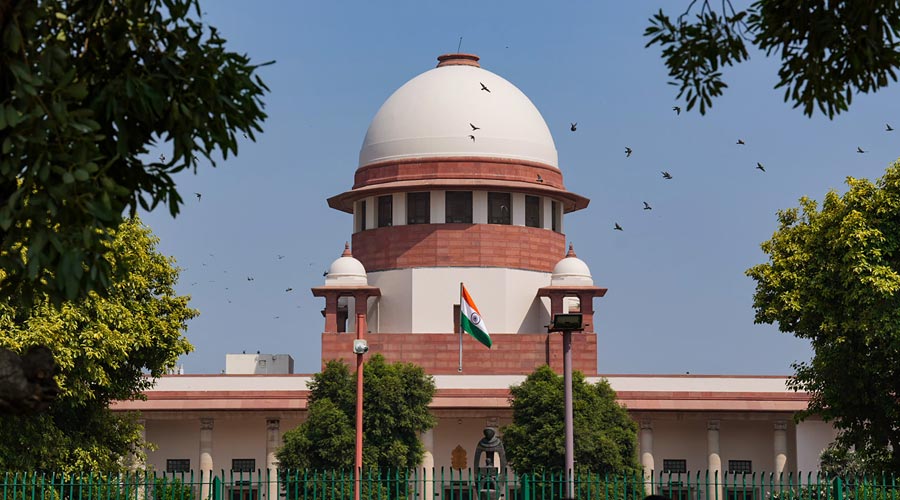The National Legal Services Authority (NALSA) on Tuesday told the Supreme Court that as per recent data about 5,000 undertrial prisoners were in jails despite being granted bail and 1,417 of them have been released.
In a report filed in the apex court, the NALSA has said it is in the process of creating a "master data" of all such undertrial prisoners (UTPs), who are unable to furnish surety or bail bonds due to poverty, including the reasons for non-release from jail.
The top court had in its November 29 last year order flagged the issue of UTPs who continue to be in custody despite being granted bail on account of their inability to fulfil the conditions of bail.
The apex court had asked the states to issue directions to jail authorities to provide details of such UTPs to NALSA, which will process it for making necessary suggestions on how to deal with this issue and provide legal assistance wherever necessary.
The November 29 last year order was passed days after President Droupadi Murmu, in her maiden Constitution Day address on November 26 last year at the Supreme Court, had highlighted the plight of poor tribals of her home state Odisha and Jharkhand, saying they remain incarcerated despite getting bail for lack of money to furnish the bail amount or arrange sureties.
The matter, which relates to policy strategy for grant of bail, came up for hearing on Tuesday before a bench comprising Justices S K Kaul and A S Oka. Advocate Gaurav Agrawal, who is assisting the apex court as an amicus curiae in the matter, referred to the report filed by NALSA.
The report said that pursuant to the November 29 order, NALSA wrote to the state legal services authorities (SLSAs) to obtain details of such UTPs within 15 days and they were also directed to provide necessary legal assistance for their release.
It said by the end of December 2022, data was received from almost all the SLSAs after which the NALSA asked them to furnish a progress report regarding legal assistance and release of such UTPs who were in custody despite being granted bail.
"Based on the information received from almost all the state legal services authorities, it transpires that there were about 5,000 under trial prisoners who were in jail, despite grant of bail. Out of which, 2,357 persons were provided legal assistance. As many as 1,417 persons have since been released," the report said.
It said as per data received from Maharashtra SLSA, 703 UTPs, who continue to be in custody despite being granted bail for inability to fulfil bail conditions, were identified out of which 215 have been provided legal assistance and 314 have been released.
It said the reasons for non-release of remaining such UTPs in Maharashtra include inability to arrange surety.
The report annexed the state-wise chart according to which the number of such identified UTPs in Odisha is 238 (as per the data received from Odisha SLSA), out of which 138 have been provided legal assistance and 81 have been released.
As per the data, in Delhi, 287 such UTPs have been identified out of which 217 have been provided legal assistance and 71 have been released.
The report said one of the main reasons why the accused are in jail despite the grant of bail is that they are accused in multiple cases and are not willing to furnish bail bonds until they are given bail in all the cases, as under trial custody will be counted in all the cases.
It said wherever the reason for non-release is due to inability to furnish bonds or surety, the NALSA would be following up those cases with the respective state or district legal service authorities and hopefully in the next one or two months, more UTPs would be able to get out of the prison.
"All such prisoners in need of legal aid for modification of bail conditions will be given legal aid by the DLSAs," it said.
The report said several meetings were also held with a view to find out mechanisms for helping such prisoners.
"Accordingly, a Standard Operating Procedure has been prepared by NIC (National Informatics Centre) which also deals with this aspect (besides other issues like premature release)," it said.
The report said the NIC e-prison software, which is working in about 1,300 jails across the country, would now have a field where the date of grant of bail would have to be entered by jail authorities.
"If the accused is not released within 7 days of the date of grant of bail, the e-prison software would automatically generate a flag/reminder. Simultaneously, an email would be sent to the office of the concerned DLSA so that the DLSA could find out the reason for non-release of the accused," it said.
In the report, the NALSA has sought several directions from the apex court, including that the court which grants bail to an UTP/convict would be required to send a copy of the bail order to the prisoner through the jail superintendent on the same day or next day.
It further sought a direction that the Secretary of DLSA, with a view to find out the economic condition of the accused, may take help of the probation officers or the para-legal volunteers to prepare a report on the socio-economic conditions of the inmate which may be placed before the concerned court with a request to relax the condition of bail or surety.
Except for the headline, this story has not been edited by The Telegraph Online staff and has been published from a syndicated feed.

